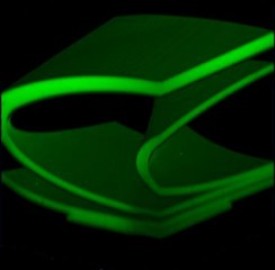Mar 17 2015
While many of us crumple up a sheet of paper into a ball in frustration, physicist Andrew Croll views it as something quite different. The structure of the bends and folds created, as well as those found in origami—the art of folding paper into beautiful objects—may help solve a larger scientific puzzle. Instead of paper, Croll and his research team at North Dakota State University, Fargo, use polymer films known as “thin films,” or extremely thin slivers of layers of material—tens of nanometers thin. A nanometer is 10,000 times smaller than the width of a human hair.
 This image from the lab of Dr. Andrew Croll of North Dakota State University, Fargo, provides a 3D image of a slice through a crumpled polymer film, showing the internal and external structure. Croll’s research, titled “Crumpled and Prescriptively Folded Polymer Films for Advanced Lightweight Materials,” is being funded by the U.S. Air Force Office of Scientific Research. The research holds potential for military and other applications. Credit: Andrew Croll, NDSU
This image from the lab of Dr. Andrew Croll of North Dakota State University, Fargo, provides a 3D image of a slice through a crumpled polymer film, showing the internal and external structure. Croll’s research, titled “Crumpled and Prescriptively Folded Polymer Films for Advanced Lightweight Materials,” is being funded by the U.S. Air Force Office of Scientific Research. The research holds potential for military and other applications. Credit: Andrew Croll, NDSU
The NDSU research team is examining how randomly crumpled and purposefully folded polymeric materials eventually could be used as lightweight structural components in aerospace applications. The secrets of these bends and folds could provide information that leads to lightweight and strong components to make aircraft and spacecraft more efficient.
To investigate these questions, Croll, assistant professor of physics, is receiving a $305,046 three-year award from the U.S Air Force Office of Scientific Research (AFOSR). The competitive award is being made through the prestigious Young Investigator Research Program.
Croll’s research proposal is titled “Crumpled and Prescriptively Folded Polymer Films for Advanced Lightweight Materials.” Manufacture of more efficient aircraft and spacecraft requires the development and characterization of new lightweight and rigid materials. The research by Croll and his team will be conducted to establish a basic understanding of the focused bending and stretching that leads to high strength-to-weight ratios in folded polymer films.
Carbon fiber composites and nanocomposites are currently one of the leading light-weight, yet rigid, materials available for aircraft design. Goals of the research by Croll include determining the basic physics behind the growth of more complex crumpled objects that can easily hold considerably higher loads.
“The research has the potential to shift development from costly new materials to the creative use of existing materials,” said Croll.
“We are trying to build an understanding of how and why thin polymer films feel strong when bent in particular ways,” said Croll. “For example, a piece of paper is flimsy, but if crumpled into a ball, it can be surprisingly strong. Paper can also be folded into intricate, functional shapes, as any origami artist knows. If the strength of the bends making up origami and crumpled balls of paper, for example, were completely understood, then engineers could use bends as ‘structural building blocks,’” he said.
The research holds potential for military and other applications. Crumpled films form a very strong, light-weight building material with the potential for 'active' material responsiveness. Lightweight materials drive down fuel costs, and responsiveness will create new technologies—solar cells that deploy themselves in space, materials that are rigid in one direction and soft in another, or materials that can fold up and “hide” or walk.
“For these advanced materials to be a reality, the basic building blocks must be completely understood,” said Croll.
He is also examining connections between bending and failure of thin polymer systems. Results of this research could eventually impact how flexible electronics such as those in wearable performance monitoring equipment work. The research could hold additional implications for conformal antennas and folded, deployable solar panels.
The AFOSR, which is funding Croll’s research, received more than 200 proposals and is awarding research grants to 57 scientists and engineers from 43 research institutions and small businesses. The Young Investigator Research Program is open to researchers in the early stages of their careers who show exceptional ability and promise for conducting basic research.
Dr. Andrew Croll joined the faculty at NDSU in 2010. He completed a post-doctoral fellowship at the University of Massachusetts. Croll was awarded his Ph.D. in polymer physics from McMaster University, Hamilton, Ontario, Canada. He received a bachelor’s degree in physics from the University of Waterloo, Ontario, Canada.
NDSU, Fargo, North Dakota, USA, is notably listed among the top 108 U.S. public and private universities in the Carnegie Commission on Higher Education’s category of “Research Universities/Very High Research Activity.” As a student-focused, land-grant research university, we serve our citizens. NDSU is listed in the Top 100 research universities in the U.S. for R&D in agricultural sciences, chemistry, computer sciences, physical sciences, psychology, and social sciences, based on research expenditures reported to the National Science Foundation. www.ndsu.edu/research
Source: http://www.ndsu.edu/